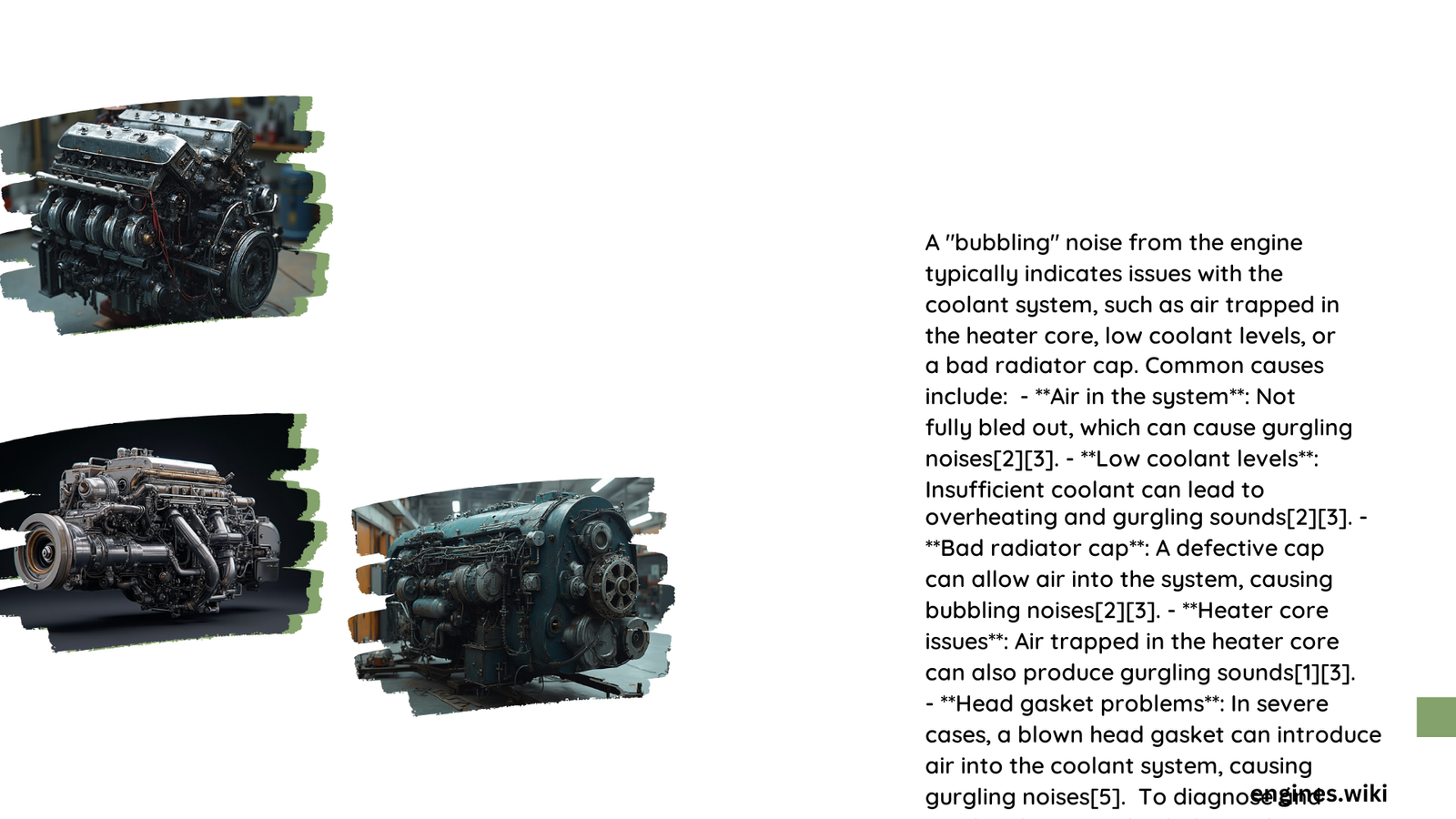Bubbling from the engine is a common issue that can indicate various problems within a vehicle’s cooling system. This phenomenon occurs when air or combustion gases enter the coolant, causing visible bubbles in the coolant reservoir. Understanding the causes, effects, and solutions to engine bubbling is crucial for maintaining optimal engine performance and preventing potential damage.
What Are the Main Causes of Bubbling from Engine?
Engine bubbling can stem from several sources, each with its own set of implications:
- Air Pockets: Trapped air in the cooling system, often due to improper bleeding after coolant replacement.
- Faulty Radiator Cap: A malfunctioning or incompatible cap allowing air to enter the system.
- Blown Head Gasket: Combustion gases leaking into the cooling system.
- Cracked Engine Block or Cylinder Head: Severe damage allowing coolant and combustion gases to mix.
- Faulty Thermostat: Improper coolant flow regulation leading to air pockets.
- Leaking Coolant Hoses: Allowing air to enter the system through damaged connections.
How Does Bubbling Affect Engine Performance?

Bubbling from the engine can have significant impacts on vehicle performance:
- Reduced Cooling Efficiency: Air pockets prevent proper coolant circulation, leading to overheating.
- Decreased Horsepower: Overheating can cause the engine to enter a protective low-power mode.
- Increased Fuel Consumption: An overheating engine may run richer, consuming more fuel.
- Potential Engine Damage: Prolonged overheating can cause severe damage to engine components.
| Performance Metric | Potential Impact |
|---|---|
| Horsepower | Up to 20% reduction |
| Fuel Efficiency | 10-15% decrease |
| Engine Lifespan | Significant reduction if left untreated |
What Are the Steps to Diagnose Bubbling from Engine?
Follow these steps to diagnose the cause of engine bubbling:
- Visual Inspection:
- Check coolant level and color
-
Inspect for visible leaks or damage
-
Pressure Test:
-
Use a cooling system pressure tester to identify leaks
-
Combustion Leak Test:
-
Employ a block tester to check for combustion gases in the coolant
-
Thermostat Check:
-
Verify proper thermostat operation
-
Radiator Cap Test:
- Ensure the cap is maintaining correct system pressure
How Can You Fix Bubbling from Engine?
Addressing engine bubbling depends on the underlying cause:
- Air Pockets:
-
Properly bleed the cooling system
-
Faulty Radiator Cap:
-
Replace with a new, compatible cap
-
Blown Head Gasket:
- Replace the head gasket
-
Potential cylinder head resurfacing
-
Cracked Block/Head:
-
Professional repair or engine replacement
-
Faulty Thermostat:
-
Replace the thermostat
-
Leaking Hoses:
- Replace damaged hoses and clamps
What Preventive Measures Can Avoid Engine Bubbling?
To prevent bubbling from the engine:
- Regular Maintenance: Follow manufacturer-recommended service intervals
- Proper Coolant: Use the correct type and mixture of coolant
- Careful Filling: Avoid air pockets when refilling coolant
- Prompt Repairs: Address any cooling system issues immediately
How Often Should You Check for Engine Bubbling?
Regular checks can prevent serious issues:
- Visual Inspection: Monthly
- Coolant Level Check: Every oil change
- Pressure Test: Annually or at first sign of issues
- Coolant Replacement: As per manufacturer schedule (typically every 30,000-50,000 miles)
What Are the Long-Term Consequences of Ignoring Engine Bubbling?
Ignoring bubbling from the engine can lead to:
- Catastrophic Engine Failure: Severe overheating can cause irreparable damage
- Increased Repair Costs: Minor issues can escalate to major repairs
- Reduced Vehicle Reliability: Frequent breakdowns and performance issues
- Decreased Resale Value: A history of overheating can significantly impact a vehicle’s value
By understanding the causes and implications of bubbling from the engine, vehicle owners can take proactive steps to maintain their engine’s health and performance. Regular maintenance and prompt attention to any cooling system issues are key to preventing the potentially severe consequences of engine bubbling.
References:
1. What Causes Bubbles in the Coolant Reservoir?
2. Water radiator is bubbling – Car Talk Community
3. What’s That Bubbling Sound In Your Car? Find Out Fast – YouTube
